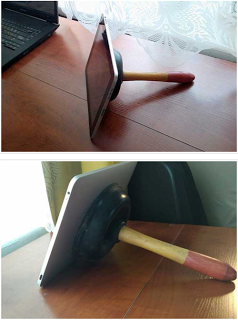What do you call those household items whose selling features are purportedly practical, functional and ‘innocent’ but instead are often bought for completely different, and sometimes ‘naughty’ reasons?
In time the makers hear of this secondary use and exploit this “extra” feature, or modify the design in order to meet public demand, without confessing the real reason behind it.
I'm thinking in particular of those massage instruments sold for “back pain” such as the one below. Nowadays, we'd simply call it a vibrator, but until the mid-fifties these gizmos were called massagers

Today on supermarket shelves there are certain roll on deodorants (for both sexes) whose size and friendly ergonomic shapes are unequivocally sexual. I suppose there aren't that many taboos left but the fact that one can openly display a deodorant stick in one bathroom's cabinet without embarrassment is very convenient…
On a much more serious note, there are certain cough medicines that are sold over the counter that customers discover have secondary/hidden benefits (initially anyway).
Some over-the-counter (OTC) and prescription cough and cold medicines contain active ingredients that are psychoactive (mind-altering) at higher-than-recommended dosages and are frequently abused for this purpose.
• Dextromethorphan (DXM), a cough suppressant and expectorant found in many OTC cold medicines. It may produce euphoria and dissociative effects or even hallucinations when taken in quantities greater than the recommended therapeutic dose.
• Promethazine-codeine cough syrup, a medication that contains codeine, an opioid that acts as a cough suppressant and can also produce relaxation and euphoria when consumed at a higher-than-prescribed dose.
… cough syrups, pills, and gel capsules containing DXM—particularly “extra strength” forms—are frequently abused by young people (who refer to the practice as “robo-tripping” or “skittling”).
What do you call products whose hidden or secondary function is really its selling point? I might call them double entendre products, but do manufacturers have their own jargon?
What do you call any product whose secondary use (or abuse) is accidentally discovered and then becomes its raison d'être. Any product can fall in this category. In the comments below, Tushar Raj suggested bubble wrap which has become famous for being a stress reliever, and less so for its primary purpose: wrapping fragile objects.




